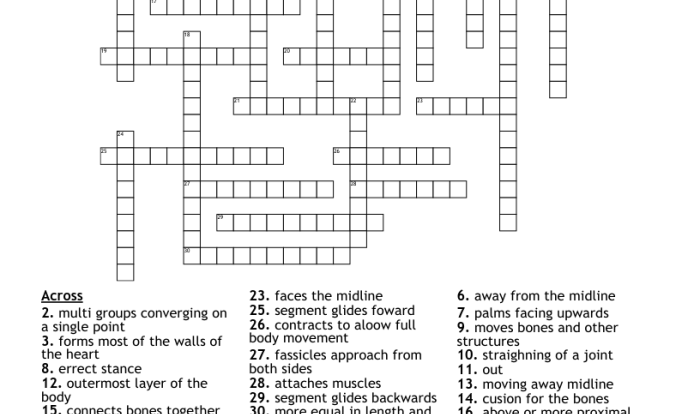Members of a household crossword – Embark on a captivating exploration of “Members of a Household” through the lens of crossword puzzles. This comprehensive guide unravels the intricate dynamics, roles, and legal implications within a household, offering a fresh perspective on the familiar concept.
From the traditional nuclear family to the complexities of blended households, this guide delves into the diverse tapestry of family structures. It examines the legal and financial implications of non-family members residing in a household, shedding light on the responsibilities and challenges involved.
Family Members

A household consists of a group of people who reside together and share a common living space. Family members are the primary occupants of a household, and they play various roles and responsibilities within the family unit.
There are different types of family structures, each with its unique characteristics and dynamics. The most common types of family structures include nuclear families, extended families, and blended families.
Nuclear Families
Nuclear families are the most common type of family structure. They consist of a married couple and their biological or adopted children. Nuclear families are characterized by strong emotional bonds and a shared sense of responsibility.
- Parents:The parents in a nuclear family are responsible for providing financial support, emotional guidance, and physical care for their children.
- Children:The children in a nuclear family typically depend on their parents for financial support, emotional support, and guidance.
Extended Families
Extended families include nuclear families plus additional relatives, such as grandparents, aunts, uncles, or cousins. Extended families often live in close proximity to each other and provide support and companionship to one another.
- Grandparents:Grandparents in extended families often play a significant role in the lives of their grandchildren, providing love, support, and wisdom.
- Aunts and Uncles:Aunts and uncles in extended families can provide emotional support and guidance to their nieces and nephews.
- Cousins:Cousins in extended families can provide companionship and support to one another, especially if they are close in age.
Blended Families
Blended families are formed when two people who have children from previous relationships come together to form a new family. Blended families can be complex, as they involve the merging of two different family units.
- Parents:The parents in blended families have the responsibility of parenting both their biological children and their stepchildren.
- Stepparents:Stepparents in blended families can provide love, support, and guidance to their stepchildren, but they may also face challenges in establishing a close relationship with them.
- Stepsiblings:Stepsiblings in blended families can develop close relationships with one another, but they may also experience rivalry or conflict.
Non-Family Members

Non-family members refer to individuals residing in a household who are not related to the primary occupants by blood, marriage, or adoption. Their presence can arise from various circumstances, including shared living arrangements, financial considerations, or personal preferences.
Roommates
Roommates are individuals who share a living space, typically an apartment or house, and share common areas such as kitchens and bathrooms. They may be friends, colleagues, or acquaintances who come together to reduce housing costs or enjoy the benefits of shared living.
Boarders
Boarders are individuals who rent a room in a homeowner’s residence. They typically have their own private space but share common areas with the homeowner. Boarders often pay rent and may contribute to household expenses, such as utilities or groceries.
Guests
Guests are individuals who temporarily reside in a household for a short period, typically for social or family reasons. They may be visiting from out of town, staying for a special occasion, or seeking temporary shelter. Guests typically do not contribute financially to the household.
The presence of non-family members in a household can have legal and financial implications. It is essential to establish clear agreements regarding rent, utilities, shared expenses, and responsibilities. Written agreements, such as roommate agreements or lease contracts, can help prevent misunderstandings and protect the rights of all parties involved.
Household Dynamics

Within a household, various dynamics can emerge, influenced by factors such as age, gender, income, and cultural backgrounds. These dynamics shape the relationships and interactions among household members, affecting the overall functioning and well-being of the family unit.
Factors Influencing Household Dynamics
Age:Different age groups within a household can lead to generational gaps, varying perspectives, and distinct needs. For instance, young children require significant care and attention, while older adults may need support and assistance with daily tasks.
Gender:Gender roles and expectations can impact household dynamics, influencing the division of labor, decision-making, and communication patterns. Traditional gender norms may perpetuate unequal power dynamics, while more egalitarian households foster shared responsibilities and mutual respect.
Income:Financial resources play a crucial role in shaping household dynamics. Economic disparities can lead to stress, financial strain, and power imbalances within the family. Conversely, financial stability can provide a sense of security and enable families to access opportunities for growth and well-being.
Healthy and Unhealthy Household Dynamics
Healthy Household Dynamics:
- Open and effective communication
- Mutual respect and support
- Shared responsibilities and decision-making
- Emotional warmth and connection
- Boundaries and privacy
Unhealthy Household Dynamics:
- Lack of communication or ineffective communication
- Power imbalances or control
- Unresolved conflicts or constant tension
- Emotional distance or isolation
- Abuse or neglect
Household Management

Household management encompasses the various tasks necessary for the smooth functioning of a household. These responsibilities range from daily chores to financial management and home maintenance, ensuring the well-being and comfort of household members.
The roles and responsibilities within a household are often shared among members based on age, abilities, and preferences. Effective household management requires cooperation, communication, and a willingness to contribute to the shared space.
Daily Chores
Daily chores are essential tasks that contribute to the cleanliness and order of a household. These tasks may include:
- Making beds
- Tidying up common areas
- Cleaning bathrooms and kitchens
- Taking out the trash
- Doing laundry
Financial Management
Financial management involves planning, budgeting, and tracking household expenses to ensure financial stability. This includes:
- Creating a budget
- Tracking income and expenses
- Paying bills on time
- Saving for emergencies and future goals
Home Maintenance, Members of a household crossword
Home maintenance tasks are crucial for preserving the condition and safety of the household. These tasks may include:
- Performing minor repairs
- Cleaning gutters and downspouts
- Checking smoke and carbon monoxide detectors
- Scheduling regular inspections and maintenance
Popular Questions: Members Of A Household Crossword
What are the different types of family structures?
Nuclear families, extended families, blended families, single-parent families, and multi-generational families.
What are the legal implications of having non-family members in a household?
Legal liability, financial responsibility, and potential tax implications.
What are the key factors that influence household dynamics?
Age, gender, income, cultural background, and relationship dynamics.
What are the essential tasks involved in household management?
Daily chores, financial management, home maintenance, and childcare.


